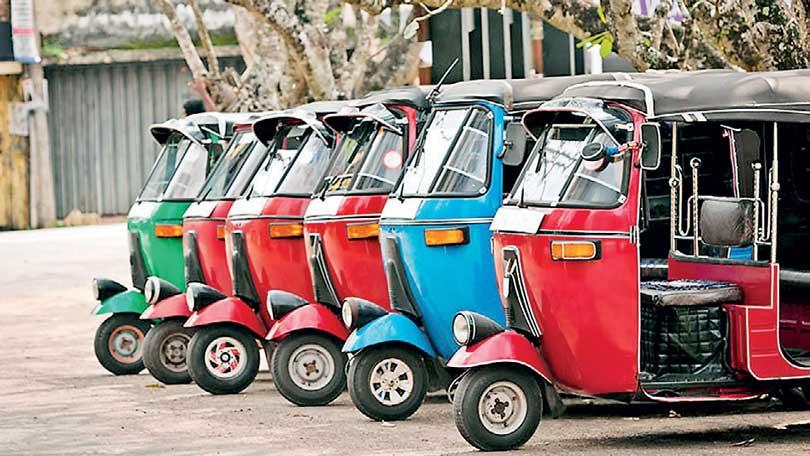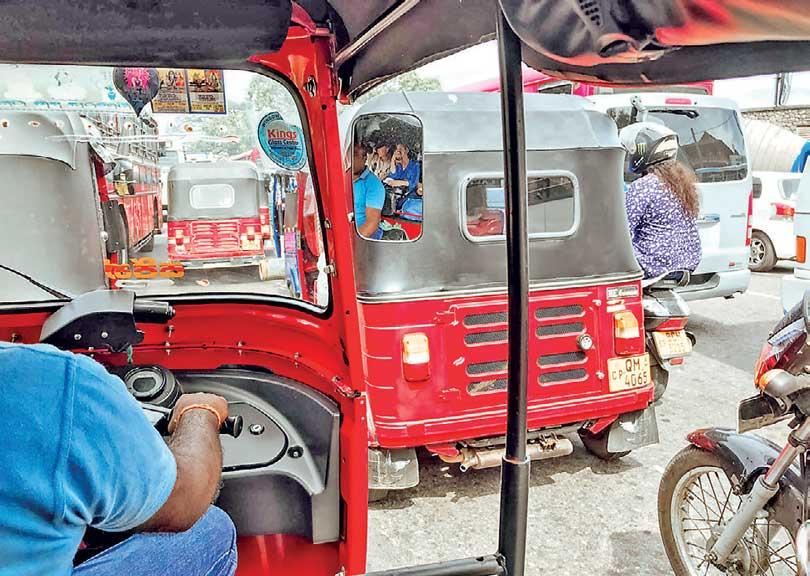30 Oct 2019 - {{hitsCtrl.values.hits}}

 Relatively inexpensive, ubiquitous and convenient, three-wheelers offer an indispensable service to Sri Lankans. The most important advice any seasoned three-wheeler passenger would offer a first-timer would be to learn the art of haggling.
Relatively inexpensive, ubiquitous and convenient, three-wheelers offer an indispensable service to Sri Lankans. The most important advice any seasoned three-wheeler passenger would offer a first-timer would be to learn the art of haggling.
While some three-wheeler drivers use a fixed meter, some still decide on the rate of each ride based on their own whims and fancies. Some even go as far as to use threats and the collective power of the ‘three-wheeler mafia’ to dictate prices and intimidate drivers and passengers who use app-based platforms.
App-based taxi-hailing platforms were the biggest change agents that disrupted the status quo maintained strictly by three-wheeler drivers. Let us look at the current trends and future possibilities of Sri Lanka’s passenger mobility landscape.
Fixed meters
Fixed meters first made an appearance about a decade ago, to the delight of Sri Lankans (the writer included) who wished for a fairer pricing system. For a while at least, the new system leveled the field a little to give some leeway to passengers. However, it did not take long for the three-wheeler drivers to bend the rules to suit their agenda.
As the fixed meters are entirely at the drivers’ disposal, some appear to be manipulating the devices. Often, unsuspecting passengers end up paying exuberant rates at the end of their journey.
To make matters worse, different drivers charge different rates for the first kilometer and then follow an entirely different structure for the remaining kilometers of any journey.
Moreover, the rate structures tend to change depending on the time of the day. For example, a passenger that pays Rs.45 per kilometer to get to work in the morning may have to pay Rs.55 to cover the same distance back after 8:00 p.m.
Fining a fair rate depends entirely on your own luck or ‘passenger karma’.
The bottom line is that even though the fixed meters appear to offer a better alternative to unpleasant haggling, in some cases appearances can be deceptive. Unless we are able to collectively agree on a regulation mechanism, even fixed meter three-wheeler drivers will continue on their highly irregular merry way.
App-based taxi-hailing services
A few years ago, app-based taxi-hailing services presented a welcome alternative to the safety and price-conscious passengers.
According to recent reports, mobile penetration in Sri Lanka has risen from 96 percent in 2012 to 126 percent in 2017. As more and more citizens get used to relying on various apps, which appear to be a rapidly growing trend in Sri Lanka, taxi-hailing apps too will become more and more relevant.
Most app-based taxi-hailing platforms allow passengers to track the driver and route. This ensures passenger safety. Even if a passenger accidently leaves behind personal belongings, they can use the tracking system to contact the driver and get their valuables back.
In addition, reputed app-based taxi-hailing companies hold their drivers accountable, a fact that further increases passenger safety.
More to the point, these taxi-hailing apps offer affordable and well-regulated rates to passengers.
Hence, more and more passengers are turning to app-based taxi-hailing platforms to seek a well-structured pricing system and safety.
Three-wheeler mafia
In August 2019, Dale Phillip, a visiting vlogger to Sri Lanka, uploaded a video of his encounter with a three-wheeler driver who tried to scam him into paying more for a short journey. As Dale was familiar with Sri Lanka’s routes, he managed to outsmart the scheming driver. This was but a tame example of dishonest behaviours of some three-wheeler drivers.
In some of the extreme cases, foreign tourists and some local passengers have had to live through ordeals of three-wheeler mafia hunting down app-based three-wheeler rides and attacking the drivers and cornering passengers. Such incidents frequently occur in localities such as Negombo, Galle Fort and Kandy, where tourists often travel in search of cultural attractions and entertainment.
These incidents highlight some of the dark issues reigning in the country’s passenger mobility market, more specifically the three-wheeler market.
While it is up to the authorities to tackle the larger issue of mobs trying to take control of a certain market by illegal means, passengers can make themselves heard through standing up to drivers that try to scam them.
While it may be hard for everyone to maintain his or her cool the way Dale did, in dealing with the devious three-wheeler driver, we can choose to be more conscious of our choices.
At the moment, the safest alternative seems to be the app-based taxi-hailing market, which fortunately remains competitive enough to benefit both passengers and drivers alike.
As long as the competition remains healthy and no one tries to offer overtly low rates to scare off competition and build a monopoly, both passengers and drivers will benefit from this technology-based solution.

10 Jan 2025 14 minute ago
10 Jan 2025 2 hours ago
10 Jan 2025 2 hours ago
10 Jan 2025 4 hours ago
10 Jan 2025 4 hours ago